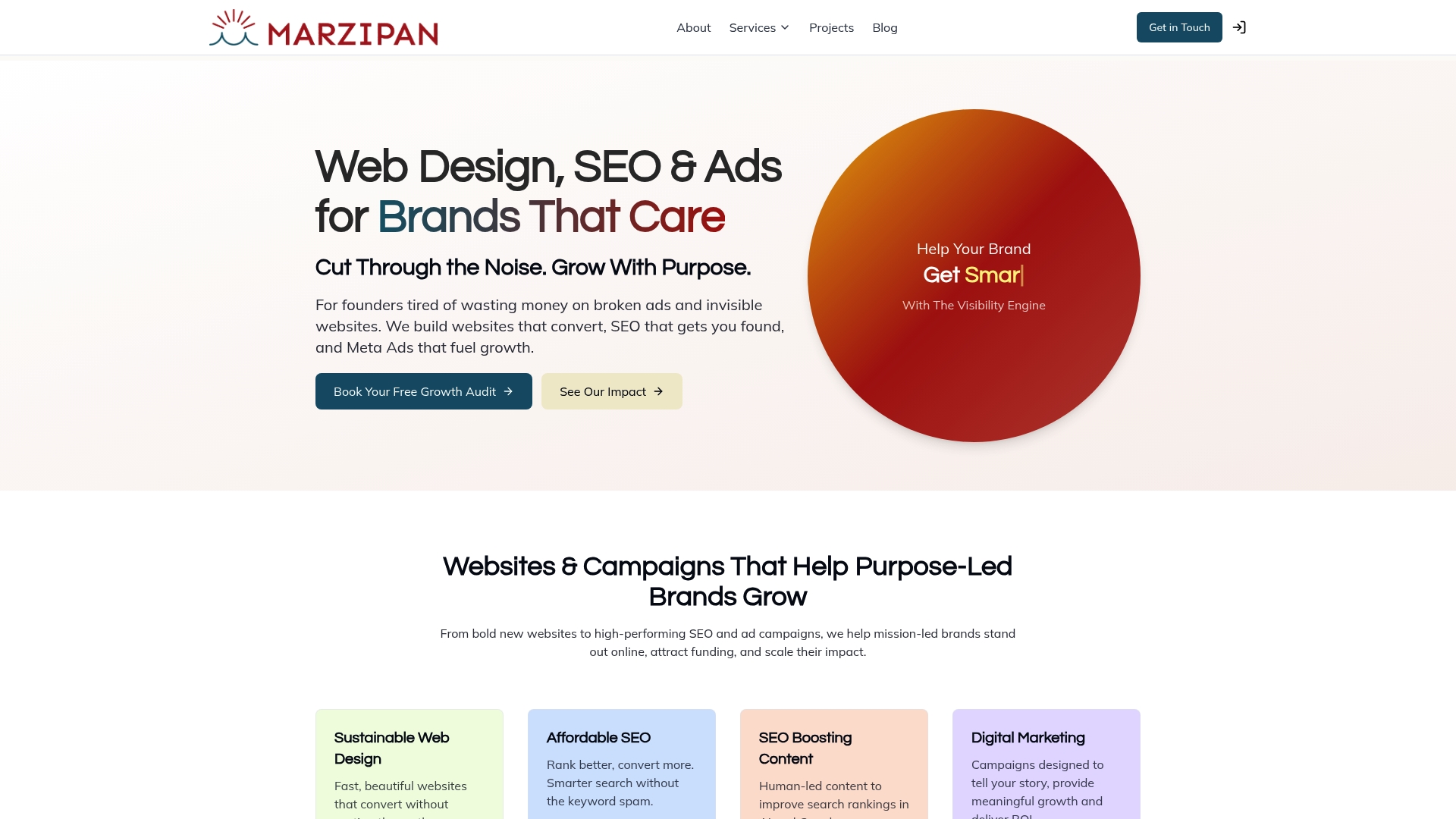Most british and Australian consumers now expect transparency from organisations they trust, with nearly 85 percent stating that social responsibility influences their choices. For marketing managers leading community-focused groups in Sydney, ethical web design and SEO offer a path that strengthens public trust while staying true to your mission. This article highlights practical steps for elevating your online presence through ethical digital solutions that reflect your values and set you apart.
Table of Contents
- Defining Ethical Marketing Companies In Sydney
- Types Of Marketing Services For Community Organisations
- How Ethical Web Design And SEO Work
- Legal Compliance And Consumer Protection Laws
- Costs, Risks And Sustainable Benefits In Sydney
Key Takeaways
| Point | Details |
|---|---|
| Ethical Marketing Focus | Ethical marketing companies in Sydney prioritise transparency and social responsibility over profits, creating a lasting impact on the community. |
| Importance of Compliance | Adhering to Australian Consumer Law and ensuring truthful advertising is vital for building consumer trust and avoiding legal issues. |
| Sustainability in Marketing | Sustainable practices provide long-term benefits, including enhanced brand reputation and stakeholder trust, outweighing initial costs. |
| Community Engagement | Tailored marketing services for community organisations focus on genuine engagement and reflection of social missions, ensuring effective communication strategies. |
Defining Ethical Marketing Companies in Sydney
Ethical marketing companies in Sydney represent a progressive approach to business that transcends traditional profit-driven strategies. These organisations prioritise transparency, social responsibility, and community impact over mere financial gain. By integrating robust ethical standards into their operational framework, they demonstrate a commitment to creating meaningful change while delivering effective marketing solutions.
In the Sydney context, ethical marketing companies are distinguished by their comprehensive approach to responsible business practices. Transparent company ratings provide crucial insights into their performance across critical dimensions such as environmental sustainability, social justice, animal welfare, and overall business ethics. These assessments offer consumers and clients a clear understanding of how these companies align their commercial activities with broader societal values.
Key characteristics of ethical marketing companies in Sydney include rigorous workplace standards, supply chain transparency, and a genuine commitment to protecting workers’ rights. Australian workplace law compliance serves as a fundamental benchmark, ensuring that these organisations maintain high standards of ethical production and responsible sourcing. This approach not only protects workers but also builds trust with consumers who increasingly seek businesses that demonstrate genuine social responsibility.
Pro tip: When evaluating an ethical marketing company in Sydney, request their detailed sustainability and social impact reports to gain comprehensive insights into their actual practices and commitments.
Here is a summary comparing the focus areas of ethical marketing companies versus traditional marketing agencies in Sydney:
| Aspect | Ethical Marketing Companies | Traditional Marketing Agencies |
|---|---|---|
| Transparency | Core business principle | Often limited to compliance |
| Social Responsibility | Actively prioritised | Rarely a central concern |
| Worker Protection | Strong standards followed | Basic legal standards only |
| Impact Measurement | Regular reporting required | Primarily financial |
| Supply Chain Ethics | Continually assessed | Not typically reviewed |
Types of Marketing Services for Community Organisations
Marketing services for community organisations require a nuanced approach that balances strategic communication with genuine social impact. Unlike traditional commercial marketing, these specialised services focus on amplifying community voices, raising awareness about critical issues, and driving meaningful engagement. Advertising and promotional techniques must be carefully tailored to reflect the unique objectives of community-driven initiatives.
The range of marketing services available to community organisations encompasses several core strategic areas. These typically include digital campaign management, stakeholder communication strategies, brand positioning for social impact, targeted outreach programmes, and storytelling that authentically represents community experiences. Digital marketing becomes particularly crucial, enabling organisations to reach broader audiences while maintaining message integrity and emotional connection.
Professional marketing support for community organisations often involves developing comprehensive communication frameworks that integrate multiple channels. Community engagement training emphasises the importance of understanding diverse audience needs, creating inclusive messaging, and developing communication strategies that respect cultural nuances. Such services go beyond traditional marketing by prioritising transparency, ethical representation, and meaningful community dialogue.
Pro tip: When selecting marketing services, prioritise providers who demonstrate a genuine understanding of your organisation’s social mission and can articulate how their strategies will directly support your community objectives.
How Ethical Web Design and SEO Work
Ethical web design and search engine optimisation (SEO) represent a holistic approach to digital presence that prioritises user experience, transparency, and genuine value creation. Ethical digital practices fundamentally transform how organisations communicate online, ensuring that digital strategies align with broader social responsibilities and user needs. This approach goes beyond traditional marketing techniques by embedding principles of fairness, accessibility, and respect into every aspect of digital communication.
At its core, ethical web design focuses on creating digital experiences that are inclusive, intuitive, and considerate of diverse user requirements. This means developing websites with clear navigation, readable typography, appropriate colour contrasts, and responsive layouts that accommodate users with different abilities. Simultaneously, ethical SEO emphasises generating authentic, high-quality content that genuinely addresses user queries rather than manipulating search algorithms through deceptive tactics.

Responsible digital content creation demands a comprehensive understanding of data privacy, user consent, and transparent information sharing. Ethical web designers and SEO specialists work together to ensure that digital platforms not only rank well but also provide meaningful, trustworthy information. This involves careful consideration of data collection practices, clear communication about how user information is used, and maintaining a commitment to truthful, valuable content that serves genuine user needs.
Pro tip: Regularly audit your digital platforms for accessibility, privacy compliance, and user-centred design to maintain an ethical and effective online presence.
Legal Compliance and Consumer Protection Laws
Marketing companies in Sydney must navigate a complex landscape of legal requirements designed to protect consumers and ensure fair business practices. Consumer protection laws establish a comprehensive framework that mandates transparency, honesty, and ethical conduct in all marketing communications. The Australian Consumer Law provides a robust national standard that applies uniformly across different states and territories, creating a consistent approach to consumer rights and business responsibilities.
The legal obligations for marketing firms extend far beyond simple compliance, requiring a proactive approach to understanding and implementing consumer protection principles. This includes ensuring all advertising claims are truthful, avoiding misleading representations, and providing clear, accurate information about products and services. Pricing transparency becomes particularly critical, with regulations prohibiting false or deceptive pricing strategies that might manipulate consumer decision-making.
Compliance and enforcement mechanisms play a crucial role in maintaining the integrity of marketing practices. The Australian Competition and Consumer Commission actively monitors business communications, investigating potential breaches and implementing penalties for organisations that fail to meet legal standards. Marketing companies must develop robust internal processes that continuously review and validate their communications, ensuring ongoing compliance with complex legal requirements that evolve alongside technological and communication landscapes.
Pro tip: Conduct regular legal audits of your marketing materials and develop a comprehensive compliance checklist to proactively identify and mitigate potential legal risks before they become problematic.
Costs, Risks and Sustainable Benefits in Sydney
Marketing companies in Sydney increasingly recognise that sustainable practices are not just an ethical imperative but a strategic business advantage. Sustainable event management guidelines demonstrate how organisations can effectively balance economic considerations with environmental and social responsibilities. The initial investment in sustainable marketing approaches may appear higher, but the long-term benefits significantly outweigh the upfront costs.
The financial landscape of sustainable marketing involves carefully assessing both tangible and intangible returns. Risk mitigation becomes a critical factor, as companies that proactively address environmental and social concerns reduce potential reputational damage and regulatory challenges. Marketing strategies that create value must now consider broader impacts beyond immediate financial metrics, integrating ethical considerations into core business models. This approach involves understanding the interconnected nature of economic performance, community engagement, and environmental stewardship.
Sustainable marketing in Sydney offers multifaceted benefits that extend well beyond traditional business metrics. Companies adopting these strategies typically experience improved brand reputation, increased customer loyalty, and enhanced stakeholder trust. The competitive advantage emerges from demonstrating genuine commitment to responsible business practices, which resonates strongly with increasingly conscientious consumers and investors who prioritise organisations making meaningful social and environmental contributions.

Pro tip: Develop a comprehensive sustainability scorecard that tracks both financial and non-financial impacts, allowing your marketing strategies to demonstrate tangible value beyond traditional economic measurements.
This table provides a comparison of common risks, costs, and lasting benefits associated with sustainable marketing practices in Sydney:
| Factor | Short-Term Impact | Long-Term Benefit |
|---|---|---|
| Implementation Cost | Higher initial outlay | Reduced long-term expenses |
| Brand Reputation | May take time to establish | Strong, enduring customer trust |
| Legal Risk | Less exposure to violations | Fewer regulatory challenges |
| Talent Attraction | Competitive but values-driven | Attracts committed professionals |
| Investor Appeal | Depends on investor priorities | Increasingly valued by investors |
Grow Your Ethical Impact with Purpose-Driven Digital Solutions
Navigating the complex landscape of ethical marketing and legal compliance in Sydney requires more than just honest intentions. If your organisation seeks to build online trust through transparency, sustainable web design and authentic SEO, you need a partner who shares your values and understands the unique challenges of mission-led brands. The article highlights the importance of delivering impact without compromise — from ethical AI integration to respecting user privacy and accessibility in digital spaces.
At Marzipan, we specialise in creating websites and digital campaigns that reflect your organisation’s social responsibility while driving measurable growth. Our approach balances:
- Ethical SEO strategies that avoid shortcuts and build lasting organic presence
- Sustainable web design emphasising inclusivity and minimal environmental impact
- Transparent communication that fosters genuine connections with your community
This means your Sydney-based organisation can confidently meet consumer protection standards and enhance brand reputation without sacrificing core values.

Ready to transform your online presence with ethical marketing that truly resonates? Discover how our tailored solutions can scale your impact and support your community goals by visiting Marzipan. Explore what ethical web design means for your mission at Web Design for Community-Based Organisations and take the first step towards sustainable growth today.
Frequently Asked Questions
What is ethical marketing?
Ethical marketing focuses on transparency, social responsibility, and community impact, prioritising these values over mere financial gain in business practices.
How do I evaluate the ethical practices of a marketing company?
You can evaluate ethical practices by reviewing their sustainability and social impact reports, assessing their compliance with workplace laws, and checking transparent company ratings.
What are the key characteristics of ethical marketing companies?
Key characteristics include rigorous workplace standards, supply chain transparency, commitment to protecting workers’ rights, and prioritising social responsibility in their marketing strategies.
Why is legal compliance important for marketing companies?
Legal compliance is essential to protect consumer rights and ensure fair business practices, which helps in building trust and maintaining the integrity of marketing communications.
